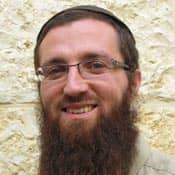First and foremost, what we mean by the Torah is an instruction book for life and the universe. Just as when one buys a computer the manufacturer includes with it an instruction book detailing how to use, get the most of, and not cause a malfunction to the computer, so too the Manufacturer of our lives and the world included an instruction book detailing how to use, get the most out of, and not cause damage to our lives and the world. The Torah, therefore, is a treasure since without it we would be as small children with a computer—not having a clue what it is for and what to do with it.
This point is all the more clear today.
Currently, we have technology that could not have been dreamt of in almost all of human history. If we were to show someone from 300 years ago the technology we have today, he would think that we live in utopia, that there must be eternal bliss, happiness, and satisfaction. Yet here we are in the "modern world" with all this advanced technology and people are not happy. In fact, many of us are depressed.
This is because, without the Torah, we are missing the purpose.
That is to say, technology does not bring happiness. Leisure too does not bring happiness. Technology brings technology and leisure brings leisure. The question then becomes what you do with that technology and leisure time.
If I Had a Million Dollars
The answer to this question involves a bigger question: What if I had everything? Then what would I do? Although we do not realize it, in the world of affluence in which we live, this is the question that is plaguing people. What am I worth and what is worth investing in? When you get down to it, most people's answer is that there is nothing worth investing in other than myself. And so if they had it all, they would lay on a beach, chase as many temporal pleasures as possible, and download seasons of their favorite television shows for all eternity. However, many people do, more or less, live in such effort-free surroundings in which this "utopian" life is the norm, and it is they, in particular, who are depressed.
Without one's true path toward self-actualization, the human being will be left unsatisfied—the greater the individual's potential, the more dissatisfied he will be.
In a sense, he creates for himself a miniature Hell.
One understanding of Hell in Judaism is a sense of lack, loss, and missed opportunity, in which the "fires of Hell" is the burning regret of greater potential left unfulfilled. However, this ill-feeling that surfaces when we are not being who we could be is also motivational. It is the fertile ground upon which we are pushed to build ourselves into who we truly can be. Just as we send our children to kindergarden to grow into the potential of who they are, we are all seeds in God's garden and the water by which we grow is the Torah—our path toward self-actualization. We can say that the Torah is the original Self-Help Book by which God acts as our Life Coach guiding us toward growth into the reality of who we are.
Learning with a Passion
We make a blessing on the Torah every morning in order to increase God-awareness into our Torah experience. Initially this sounds strange since the Torah itself is entirely God-based and God-oriented. However, when we look around it is easy to see how one can become complacent within Torah. Even being involved in Torah can become habitual. One can get stuck in the nitty-gritty of Jewish law and lose sight of the bigger picture—the One who gave the Torah.
The purpose of blessing on the Torah is to increase the awareness of the Giver of the Torah. By increasing the awareness of the Torah's Source, you increase the passion for Torah learning and observance—you turn Checklist Judaism into Passionate Judaism.
Perhaps this is why every tractate of Talmud begins with Page 2. Maybe Page 1 is that which must come before you open the Talmud—the motivation and purpose to open the Talmud in the first place.
It seems that this is what the blessing on the Torah is all about—the increasing of God-awareness that precedes Torah learning. While, obviously, Torah learning is always valuable, how much more valuable is Torah learning that is done with a passion, infused with a motivation to come close to the Giver of the Torah! Just as the deeper one understands one's spouse's thoughts, the more of a personal connection is facilitated, so too, the more one understands God's "thoughts," the more of a connection is facilitated.
Similarly, just as a Torah scroll that is written without the proper intent is worthless (despite the fact that the words of the Torah may be perfectly written, in order, etc.) because the letters are merely physical shapes when written without proper intent, so too, involvement in the nitty-gritty of Jewish law without a focus on the deeper meaning and Giver of those laws results in the experiencing of Jewish law as merely a ritualistic routine in which one brainlessly goes through the motions. (Of course, there is always inherent value to one's keeping to Jewish law regardless of his intent or lack thereof, just as in a husband-wife relationship there is inherent value in doing a spouse's request even if it is not done with the deepest understanding of the other. Nevertheless, the personal experience of the individual lacking deeper intent, focus, and understanding of one's spousal relationship or of Jewish law will be one without life and vigor, like a shell without a nut—external and not internal.)
4/13/2011 4:00:00 AM





